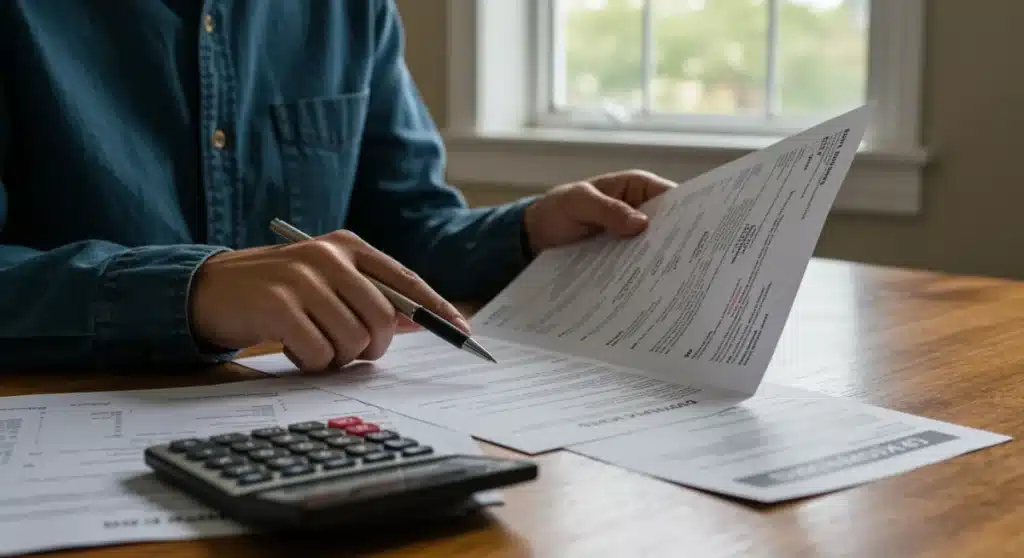Property Tax Assessments 2025: Overstated Home Value Solutions

Homeowners facing property tax assessments 2025 with an overstated home value can effectively challenge the appraisal by understanding appeal processes, gathering robust evidence, and adhering to strict deadlines.
With property tax assessments 2025 on the horizon, many homeowners are bracing for potential changes that could significantly impact their finances. What happens, however, if your home’s assessed value appears to be overstated by 10% or more? Understanding your rights and the steps to take is paramount to protecting your investment and ensuring fair taxation.
Understanding Your 2025 Property Tax Assessment Notice
The arrival of your property tax assessment notice for 2025 can often be a moment of anxiety, especially if the valuation seems incorrect. This document outlines your property’s assessed value, which directly influences your tax bill. It’s crucial to review this notice immediately and thoroughly, as it sets the stage for any subsequent actions you might need to take.
Property assessors utilize various methods to determine your home’s value, including recent sales of comparable properties, property improvements, and market trends. However, these methods are not always flawless and can sometimes lead to an inflated assessment. Identifying such discrepancies early is key to a successful appeal.
Key Information on Your Assessment Notice
Your assessment notice contains vital details that you must scrutinize. This includes the assessed value, the effective date of the assessment, and the deadline for filing an appeal. Missing these deadlines can severely limit your options for recourse.
- Assessed Value: The core figure determining your tax burden.
- Effective Date: The date the valuation was made, often preceding the notice date.
- Appeal Deadline: The critical window within which you must file any challenges.
- Property Characteristics: Verify the accuracy of details like square footage, number of bedrooms/bathrooms, and lot size.
Identifying an Overstated Home Value
Determining if your home’s assessed value is indeed overstated requires diligent research and a clear understanding of your local real estate market. An assessment that is 10% higher than your property’s true market value is a significant red flag that warrants immediate action. This discrepancy could stem from outdated data, incorrect property characteristics, or an assessor’s misjudgment of local market conditions.
Start by comparing your property’s assessment to recent sales of similar homes in your immediate neighborhood. Look for properties with comparable square footage, age, condition, and amenities. Online real estate platforms and local real estate agents can be invaluable resources in this initial research phase.
Common Reasons for Overvaluation
Several factors can contribute to an inflated assessment. Understanding these can help you pinpoint the flaw in the assessor’s valuation and build a stronger case for appeal.
- Outdated Sales Data: Assessors might use sales data from a period when market values were higher.
- Incorrect Property Data: Errors in the assessor’s records regarding your home’s size, features, or condition.
- Lack of Interior Inspection: Assessments are often done from exterior views, missing internal issues that devalue a home.
- Neighborhood Decline: If your area has seen a decline in property values, the assessment might not reflect this.
Gathering Evidence for Your Appeal
A successful appeal against an overstated property tax assessment hinges on compelling evidence. Simply stating that your home is overvalued is not enough; you must provide concrete data to support your claim. This evidence should directly challenge the assessor’s valuation and demonstrate a more accurate market value for your property.
Begin by compiling a list of comparable sales, also known as ‘comps.’ These are properties that have recently sold in your area and are similar to yours in terms of size, age, condition, and features. The closer the comps are to your home and the more recent their sale dates, the stronger your argument will be. 

Types of Evidence to Collect
Beyond comparable sales, several other types of evidence can bolster your appeal. Think broadly about anything that supports a lower valuation for your home.
- Recent Appraisal: An independent appraisal conducted by a certified appraiser can provide a professional, unbiased valuation.
- Photos of Defects: Document any structural issues, deferred maintenance, or significant defects that negatively impact your home’s value.
- Repair Estimates: Obtain estimates for necessary repairs that would significantly reduce your home’s market appeal.
- Income-Producing Property Data: If your property generates income, provide expense and income statements to show its true financial performance.
The Property Tax Appeal Process for 2025
Navigating the property tax appeal process can seem daunting, but understanding each step is crucial for a favorable outcome. While the exact procedures vary by jurisdiction, there’s a general framework that homeowners can expect to follow. Adhering to deadlines and submitting complete documentation are critical components of a successful appeal.
Typically, the process begins with an informal review or a formal appeal to the local assessment board. This initial stage allows you to present your evidence and discuss your concerns directly with an assessor or a review committee. Be prepared to clearly articulate why you believe your assessment is incorrect and how your evidence supports a lower valuation.
Steps in the Appeal Process
Knowing what to expect can help you prepare adequately and increase your chances of success. Each step is an opportunity to present your case effectively.
- Informal Review: Often the first step, involving a direct discussion with the assessor’s office.
- Formal Appeal: If the informal review is unsuccessful, you’ll file a formal appeal with a local review board.
- Hearing Preparation: Organize your evidence, practice your presentation, and be ready to answer questions.
- Decision and Further Appeals: The board will issue a decision; if still unsatisfied, further appeals to higher bodies may be possible.
Tips for a Successful Property Tax Appeal
Successfully appealing your 2025 property tax assessment requires more than just gathering evidence; it demands strategic planning and effective communication. Approaching the process with a clear strategy can significantly improve your chances of reducing an overstated valuation. Remember that assessors are often dealing with a high volume of appeals, so making your case clear, concise, and well-supported is essential.
One key tip is to always remain respectful and professional, even if you feel frustrated. A cooperative attitude can go a long way in facilitating a productive discussion. Focus on facts and data, rather than emotional arguments. Highlight specific discrepancies and back them up with the evidence you’ve meticulously collected.
Maximizing Your Appeal’s Impact
Consider these strategies to make your appeal as effective as possible. Professional advice can also be a game-changer in complex cases.
- Be Timely: File your appeal well before the deadline to avoid forfeiture.
- Know Your Market: Understand local real estate trends and how they impact your home’s value.
- Highlight Unique Flaws: Point out any specific issues with your property that might not be obvious from an exterior view.
- Seek Professional Help: If the assessed value is significantly high or the process is too complex, consider hiring a property tax consultant or real estate attorney.
What to Do if Your Appeal is Denied
Even with a strong case, there’s a possibility your initial property tax appeal might be denied. This isn’t necessarily the end of the road. Many jurisdictions offer further avenues for appeal, allowing homeowners to escalate their case to higher authorities. Understanding these next steps is crucial for continuing to fight an overstated assessment.
If your appeal is denied by the local assessment board, review the reasons for the denial carefully. This feedback can provide valuable insights into weaknesses in your initial presentation or areas where you need to strengthen your evidence. It’s an opportunity to refine your approach before moving to the next level.
Next Steps After Denial
Depending on your location, there are typically one or two more levels of appeal available. Each stage will have its own procedures and deadlines, which you must strictly adhere to.
- State-Level Appeals Board: Many states have a property tax appeals board that hears cases from local denials.
- Judicial Review: As a last resort, you might be able to file a lawsuit in court. This option is often costly and time-consuming.
- Re-evaluate Evidence: Use the feedback from the denial to gather additional, more compelling evidence or to present existing evidence more effectively.
- Consult an Attorney: For higher-level appeals, especially judicial review, legal representation is highly recommended.
| Key Point | Brief Description |
|---|---|
| Review Assessment Notice | Carefully examine your 2025 notice for accuracy and appeal deadlines. |
| Gather Evidence | Collect comparable sales data, appraisals, and photos of defects to support your claim. |
| Follow Appeal Process | Adhere to local procedures, beginning with informal review, then formal appeal. |
| Seek Professional Help | Consider hiring a consultant or attorney for complex cases or higher-level appeals. |
Frequently Asked Questions About Property Tax Appeals
The timeframe varies by jurisdiction but usually falls within 30 to 90 days after receiving your assessment notice. It’s crucial to check your specific notice for the exact deadline to ensure you don’t miss the opportunity to appeal.
While not always required for initial appeals, an attorney can be beneficial, especially for complex cases or higher-level appeals. For simpler cases, homeowners can often manage the process themselves by gathering strong evidence.
Focus on homes that have sold recently (within 6-12 months) in your immediate neighborhood. They should be similar in size, age, condition, lot size, and features to your own property for the strongest comparison.
While rare, it is theoretically possible for an assessor to uncover undervalued aspects of your property during an appeal, leading to a higher assessment. However, if your evidence for overvaluation is strong, this risk is generally low.
Your recent purchase price is often the strongest piece of evidence you can present. If your home was bought at arm’s length for a lower price than the assessment, it’s a powerful indicator of overvaluation and should be highlighted in your appeal.
Looking Ahead – Ensuring Fair Property Valuation in a Changing Market
The evolving landscape of property values and tax assessments continues to challenge homeowners across the United States, demanding greater financial literacy and proactive engagement. As we approach 2025, economic shifts, inflationary pressures, and localized housing demand are reshaping how properties are evaluated—and how much their owners are expected to contribute in annual taxes. Understanding the mechanics of assessment is no longer optional; it has become an essential aspect of responsible homeownership and financial planning.
Accurate assessments directly affect not only a homeowner’s personal budget but also broader community development, as property taxes remain a cornerstone of local government funding for schools, infrastructure, and public services. For this reason, staying informed about valuation methodologies and appeal procedures is crucial. Educational resources like Investopedia’s guide to property tax assessments provide valuable clarity on how assessments are calculated, what influences them, and how individuals can challenge inaccuracies effectively.
Looking forward, homeowners should anticipate continued variability in assessments as market corrections and new zoning adjustments take shape. Those who maintain detailed records of property improvements, monitor neighborhood sale trends, and seek professional guidance when needed will be best positioned to defend their property’s true value. At the same time, collaboration between taxpayers and local assessors can foster greater transparency and fairness, ensuring that taxation aligns with real economic conditions rather than outdated metrics.
Ultimately, success in navigating this dynamic system will depend on awareness, preparation, and advocacy. By understanding how property tax assessments operate and taking an active role in the process, homeowners can protect their equity, contribute to fiscal fairness, and strengthen the integrity of their communities for years to come.





